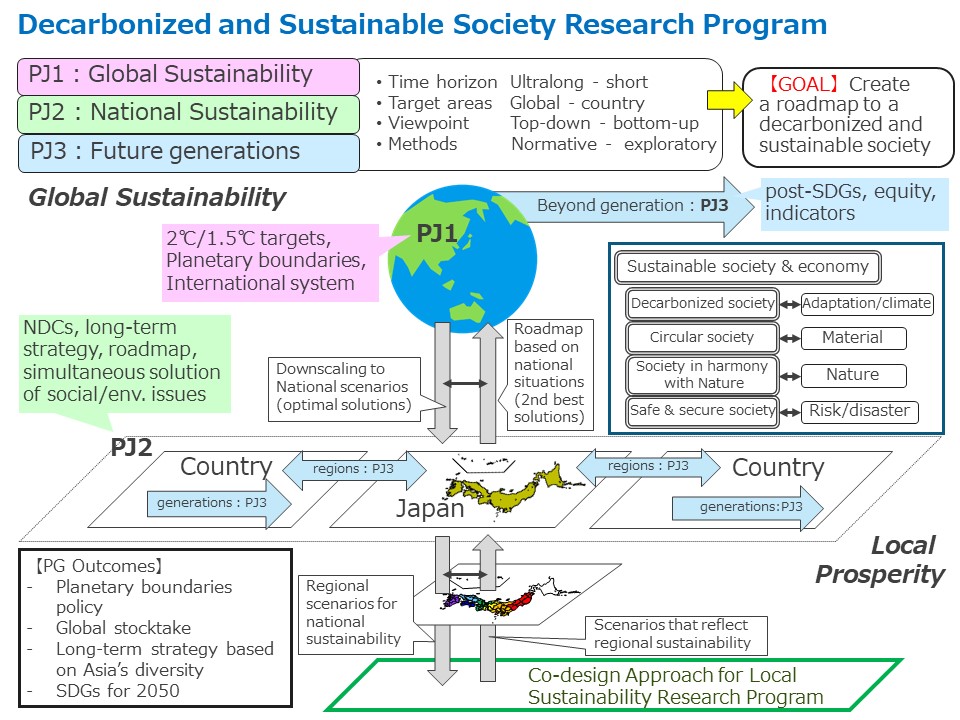Outline
We are working on presenting a vision and a set of principles for the realization of a sus-tainable society. Research and technological developments aimed at realizing these goals are being conducted to address the discovery and utilization of new technological seeds that contribute to solving environmental issues. Research and technological developments related to climate change mitigation measures includes the elucidation, prediction, and assessment of global warming countermeasures.
Three projects

Project 1 Simultaneous Achievement of Global Decarbonization and Sustainability
In PJ1, research is being conducted to quantitatively clarify the effects and impacts of var-iations in energy and service demand due to differences in economic activities, the pro-spects for the dissemination of measures through technological innovation and locking-in, and the introduction of international systems such as finance toward the realization of the Paris Agreement. A group of models for evaluating mitigation measures centered on tech-nology selection models will be constructed on a global scale, and then the emission pathways for short- and medium-term greenhouse gases (GHGs) and short-lived climate forcers (SLCFs) and the impact of drastic reduction measures for these gases on economic activities will be quantitatively assessed. In addition, in the analysis centered on a comput-able general equilibrium (CGE) model covering the entire globe, a sustainability index assessment model will be constructed, and then various GHG emission pathways con-sistent with the Paris Agreement will be presented. We will also analyze the ripple effect on the sustainability of the mitigation measures required for the emission pathways, clarify their impact on climate under the emission pathways, and assess their fairness. Further, an integrated earth system model that links an earth system model (ESM) and an integrated assessment model (IAM) will be constructed; this model will be utilized to analyze the interactions between climate, carbon cycle, and human activity, in order to deepen under-standing of the tipping elements of the Earth system and to discuss global environmental and resource constraints.
With the whole Earth as the target area, the program will attempt to grasp the relationships between decarbonization and sustainability; examine policies, systems, and measures for the simultaneous realization of decarbonization and sustainability; and assess these efforts through the quantification of scenarios.
Project 2 Quantification of National Decarbonization and Sustainable Society Scenarios
For Japan, we will develop an IAM to assess the effects of innovative energy-saving technologies, power grid systems, and other energy supply and demand measures for drastic reductions in GHG emissions; the impact of introducing measures in response to the declining birthrate, the aging population, and the uneven distribution of urban and ru-ral areas on energy demand; and the effectiveness of innovative technologies such as IoT and AI that promote changes in behavior, private-sector ESG investment, and financial market measures for changing energy demand. These results will be used to quantify fu-ture scenarios. Moreover, for the major Asian countries, in consideration of the environ-mental issues other than decarbonization (such as air quality, waste management, etc.) that each country is focusing attention on, the program will develop an IAM capable of ana-lyzing Asian diversity (including differences in economic development between develop-ing countries and countries with economies in transition, differences between regions within the same country, and between major emission sectors, and institutional and tech-nical issues faced by each country in the formulation of long-term development strate-gies). Future scenarios will be quantified based on these factors. In addition, we will pro-pose measures, policies and systems to fill any gaps between national scenarios and the Paris Agreement.
Through these initiatives, in response to the diversity of Japan and other Asian countries and the resolution of the challenges facing each country (increasing NDC ambitions, and economic, technical and institutional constraints on long-term strategy formulation), the program will quantitatively clarify sustainable short- and medium-term decarbonization roadmaps for each country, consistent with achieving the stabilized 1.5°C and 2°C global warming scenario targets.
Project 3 Establishing a Regime Inclusive of Future Generations in a Sustainable Society
There is an increasing concern that human activities of our current generation is threaten-ing the well-being of future generations, especially as climate change consequences are widely recognized. Project 3 will present a regime that contributes to the improvement of intergenerational equity and the inheritance of a better world for future generations. To do so, first, we will revisit the concepts of intergenerational equity and related norms. These norms will be reframed by applying them to cases of realizing a decarbonized society and other specific environmental issues. Second, we will review post-SDGs (goals after sus-tainable development goals) and sustainability indicators such as inclusive wealth. We will incorporate insights from relevant fields such as environmental ethics and welfare eco-nomics and consider relevant aspects including liabilities, planetary boundaries, strong sustainability, intergenerational equity, etc. in this research task. Third, we will examine decision-making procedures that incorporate opinions of future generations and clarify drawbacks of existing institutions of decision making based on our original investigation about the differences in opinions/values between generations and possibilities of ensuring intergenerational justice by changing generational positions.
Through these efforts, we will attempt to clarify the long-term requirements for achiev-ing a global-scale decarbonized and sustainable society. In addition to quantitatively and descriptively clarifying the efforts and systems required at the national level focusing on Asia to achieve this goal, taking into account the current disparate stages of development and intergenerational equity, our findings will be compiled into a medium- to long-term roadmap as a contribution to supporting efforts toward the realization of a decarbonized and sustainable society.




